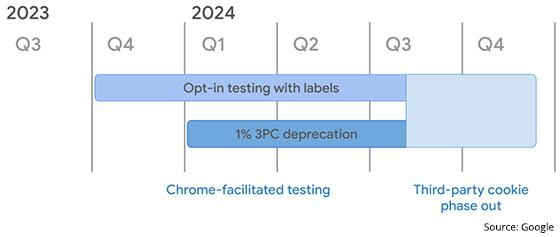
Google is preparing to release in November additional tools for
companies that evaluate their use of third-party cookies. It's a reminder to advertisers, publishers, platform providers, and the rest of the online community of its intension to disable third-party
cookies in the first quarter of next year.
“We are building a DevTools extension to facilitate analysis of cookie usage during browsing sessions,” Rowan Merewood, developer
relations for Privacy Sandbox, wrote in a post. “This will provide debugging pathways for cookies, and Privacy Sandbox features, with access points to learn and understand the different
aspects of the Privacy Sandbox initiative.”
Privacy Sandbox aims to reduce cross-site tracking while keeping online content free. The plan is to deprecate cookies for 1% of users as of
Q1 2024, and then increase to all users by Q3 2024. The move should address any remaining competition concerns of the UK’s Competition and Markets Authority (CMA), the company said.
advertisement
advertisement
Merewood, in the post,
detailed what he called the “cookie countdown.”
Two milestones are approaching in Q4 2023 and Q1 2024 as part of Chrome-facilitated testing. The testing primarily is for companies testing the Privacy Sandbox relevance and measurement
APIs, but as part of this Google will disable third-party cookies for 1% of Chrome Stable users.
“From the start of 2024, you can expect to see an increased portion of Chrome users on
your site with third-party cookies disabled even if you are not actively participating in the Chrome-facilitated testing,” Merewood wrote. “This testing period continues through to Q3 2024
when, after consultation with the CMA and subject to resolving any competition concerns, we plan to begin disabling third-party cookies for all Chrome users.”
Earlier this
year, the CMA accepted commitments from Google addressing the competition concerns that resulted in an investigation of Google’s proposals to remove third-party cookies and other functionalities
from its Chrome browser. The CMA publishes quarterly reports.
It appears that the
deprecation of third-party cookies continues to spur tighter collaboration related to data throughout the advertising industry.
On Tuesday, Amazon Web Services (AWS) announced data-matching capabilities for advertisers using AWS Entity
Resolution through integrations with LiveRamp, TransUnion, and Unified ID 2.0.
Last week, LiveRamp gave brands, publishers, and technology platforms better collaboration and a way to get more
from first-party data from any environment. The company is also working on a sophisticated data platform, where marketers will have the ability to log in to see data available from companies. Some
might include demand side platforms (DSPs) like The Trade Desk, publishers such as Paramount, or streaming partners such as Netflix or Peacock. Brands might also be included in that
list.
Interoperability between different identity solutions will become more important, according to Insider Intelligence.
The research firm said collaboration will enable data
partners to enrich first-party data to understand consumer behavior, provide a comprehensive view of the customer journey and its touchpoints, and maintain the frequency and recency caps across
multiple platforms.
Citing IAB guidance, Insider Intelligence pointed to a few challenges to achieve interoperability, such as “matching IDs based on diverse data sets, matching IDs with
different definitions of individuals and households, and consumer privacy-related methods like Apple’s “hide my email” that make it
difficult to match identities across contexts.”
Merewood also provided guidelines for the industry to prepare, including auditing third-party cookie use, testing for breakage, cross-site
cookies that store data on a per site basis, and more.